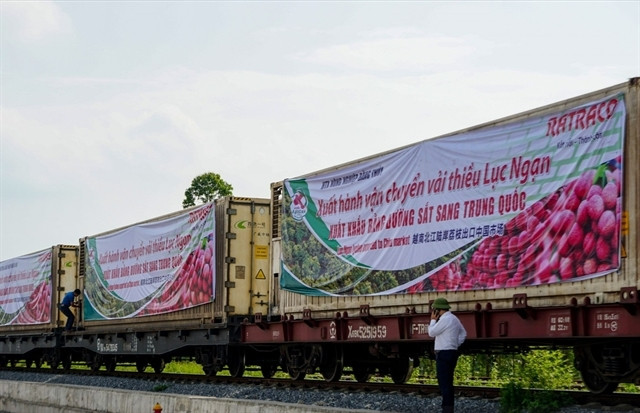 |
| A shipment of Bắc Giang’s Lục Ngạn fresh lychee exported to China by rail. — Photo Vietnambiz |
This shift from road freight - the traditional route for farm exports into China - is mainly because, in recent years, Việt Nam's railway industry has improved with international intermodal train routes being operational. Among them is an inter-modal train line departing from Cao Xá station in Hải Dương Province's Cẩm Giàng District into China.
Many exporters said they are quite surprised at the efficiency of shipping goods to China by rail.
Nguyễn Quốc Trịnh, Chairman of the Dragon Fruit Association of Long An Province, told plo.vn that members have been persuading Chinese customers to switch to bringing in things such as dragon fruit by rail due to better costs and logistics.
Because of rail stability, export prices are often more stable, without unexpected ups and downs and it can be faster, due to a quicker customs clearance process, Trịnh said.
He added that the cost of rail transport is 10-15 per cent cheaper than road transport. However, many Chinese partners remain confused as they have never used this mode of transport. Thus it takes time for local enterprises to convince them.
Đặng Phúc Nguyên, General Secretary of the Vietnam Fruit and Vegetable Association, said the railway will help diversify means of transport to China and other countries amid congestion at border gates.
However, there are concerns that goods that have to be loaded, unloaded and transported many times will be damaged while the number of refrigerated containers on the railway remains modest, Nguyên told the online newspaper.
For example, if a truck carrying vegetables and fruits has a problem with the air conditioner when it is travelling on the road, the driver can immediately stop and have the system fixed. However, trains run continuously and cannot stop in the middle of the road for repair, so the goods will be damaged, Nguyên said.
Nguyễn Duy Toàn, director of Railway Transport and Trade JSC agreed. He said farm produce exporters are still hesitant because the transportation process requires refrigerated containers and currently containers of this type are not many.
Forecasting a high demand for exporting agricultural products and fruits to China by rail in the near future, Viettel Post is researching technology for refrigerated containers on trains and at the same time building a warehouse system in Nanning City of China to facilitate import, export and distribution of goods in the neighbouring country, plo.vn reported Deputy General Director Đinh Thanh Sơn as saying.
Sơn said his company is also teaming up with Vietnam Railway Corporation, which accounts for 75 per cent of the North-South railway capacity, to exploit the Việt Nam-China intermodal route with a target of 4,000-5,000 containers each month.
Prime Minister Phạm Minh Chính has already called on ministries and departments to expand the railway capacity and expedite the construction of specialised railways to boost agricultural exports to China.
In an official telegram issued on February 6, the PM underscored the importance of stronger coordination amongst ministries and departments and a better logistics system for exporting agricultural and other products to its neighbour.
Under PM Chính’s directive, the ministries of transportation, industry and trade would work with Chinese counterparts on ways to cut costs and times in the export of agro-forestry-fishery products.
The Government leader highlighted the significance of operating international transport to connect Việt Nam and China and enhance linkages of railway systems at the border areas of Lào Cai.
Relevant ministries also need to accelerate negotiations with the Chinese side to build specialised railways for agricultural products at border gates in Lạng Sơn, Cao Bằng, Lào Cai and Quảng Ninh provinces.
In 2023, Việt Nam’s agro-product exports to China reached US$11.5 billion, with durian exports exceeding $2 billion. In addition to durian, 13 other Vietnamese agricultural products that have officially been exported to China, including bird nests, longan, rambutan, jackfruit, watermelon, banana, mangosteens, lychee, passion fruit and grass jelly. — VNS